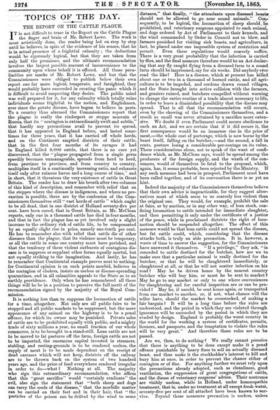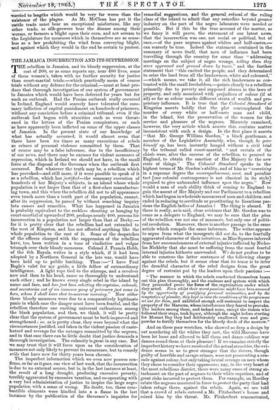TOPICS OF THE DAY.
THE REPORT ON THE CATTLE PLAG17E.
IT is not difficult to trace in the Report on the Cattle Plague the finger and brain of Mr. Robert Lowe. The work is most artistically done, the reader being led on step by step until he believes, in spite of the evidence of his senses, that he is in actual presence of a frightful calamity ; the deductions would be rigorously logical, but that they are taken from only half the premisses, and the ultimate recommendation involves the largest possible amount of inconvenience to the community upon whose behalf it is offered. All those pecu- liarities are marks of Mr. Robert Lowe, and but that the Commissioners were obliged to publish below their own report one far more logical, temperate, and farsighted, they would probably have succeeded in creating the panic which it is difficult to avoid suspecting they desire. The public mind was well prepared for it, for any calamity which totally ruins individuals seems frightful to the nation, and Englishim'n, ever since the potato disease, have began to believe in pests. To a country thus alarmed the Commissioners report that the plague is really the rinderrst or steppe murrain of Russia, that its " contagion is extraordinarily swift and subtle," that hardly any precautions avail to prevent its spread, that it has appeared in England before, and lasted some- times for three years, that it has carried off whole herds, and on the Continent emptied districts of their cattle, that in the first four months of its ravages it had in England killed 8,000 cattle, that there is no cure yet discovered, that the " plague propagated from a single germ speedily becomes unmanageable, spreads from herd to herd, from province to province, and from country to country, multiplies itself in a continually increasing ratio, and exhausts itself only after ruinous havoc and a long course of time," and in short, that it threatens the very existence of cattle in Great Britain. The reader has to draw his breath after two columns of this kind of description, and remember with relief that on the steppes where the disease is indigenous, and where no pre- caution is possible, there are by the confession of the Com- missioners themselves still " vast herds of cattle " which ought to be all dead, that in one district of Holland seventy-five per cent. have been cured, that in Great Britain, as Mr. McClean reports, only one in a thousand cattle has died in four months, and that in fact the plague has as yet involved only a slight increase to the ordinary risk of cattle life, to be compensated by an equally slight rise in price, namely one-tenth per cent. He has to remember also with relief that cattle die of other diseases than the plague, that its violence must be temporary, or all the cattle in some one country must have perished, and that the tendency of these violent outbursts of contagious dis- ease is to suppress or supplant other forms equally mortal, but not equally striking to the imagination. And lastly, he has to remember that Continental example proves next to nothing, for Continental opinion is on such points morbid, believes in the contagion of cholera, insists on useless or disease-spreading quarantines, and in all calamities appeals to the State as to an earthly providence. Only when he has remembered all these things will he be in a position to perceive the full merit of the recommendation signed by the majority of the Royal Com- mission.
It is nothing less than to sOPpress •the locomotion of cattle for a time, altogether. Not only are all public fairs to be stopped and all public markets to be suppressed, but the mere appearance of any animal on the highway is to be a penal offence, for which its owner may be punished. Private sales of cattle are to be prohibited equally with public, and a mighty trade of sixty millions a year, no small fraction of our whole commerce, is to be brought to a stand-still. Lean cattle are not to be moved to fat pastures off the farm, foreign cattle are not to be imported, the enormous capital invested in steamers, stabling, and resting-grounds is to be rendered useless, the supply of meat is to be made dependent on the receipt of dead carcases which will not keep, districts off the railway are to be thrown back on the system of two hundred years ago, and the price of food everywhere rendered irregular in order to do—what I Nothing at all. The majority who sign this extraordinary recommendation, who affirm that this "great sacrifice" would "certainly eradicate" the evil, also sign the statement that " both sheep and dogs can carry the seeds of the disease," that the morbific matter can be carried on their feet and in their hair, that " the particles of the poison can be drifted by the wind to some
distance," that finally, " the attendants upon diseased beasts. should not be allowed to go near sound animals." GIN- sequcntly, to be logical, the, locomotion of sheep should, be prohibited, and veterinary surgeons appointed to each animal,. and dogs ordered by Act of. Parliament to their kennels, and the wind commanded by Order in Council not to blow, and farmers punished for visiting sick beasts, and agriculture, in fact, be placed under one impossible system of restriction and permit. Even these regulations would scarcely suffice. There is a very great probability that the infection is carried by flies, and the final measure therefore would be au Act declar- ing that any fly caught flying from a diseased farm to a sound. farm should be imprisoned, say for six weeks. Did anybody eter read the like/ Here is a disease, which at present has killed_ about one or two in a thousand of horned cattle, and all agri- culture is to be impeded, and cordons drawn round villages,. and the State brought into active collision with the farmers, and graziers ruined, and butchers compelled without warning. to change the entire routine of a trade almost necessary to life,. in order to leave a diminished possibility that the disease may spread. That is all that the recommendation will secure, even by the showing of the Commissioners themselves, and a. result so small was never attained by a sacrifice more exten- sive. We doubt if even Parliament could secure obedience to such an Act, and we are certain that if it did secure it, the first consequence would be an immense rise in the price of meat,—the whole cost of porterage, which is now borne by the beast itself, falling on the butcher,---and the second, a fall in rents, pasture losing a considerable per-centage on its value_ These considerations alone, not to speak of the want of confi- dence which, as Mr. McClean says, would be spread among the- producers of the foreign supply, and the wrath of the con- sumers, would of themselves be fatal to the proposal, which,. again, has, it seems probable, been rejected by the Ministry. If any such measure had been in prospect, Parliament must have been called together, and of its convocation there is as yet no hint.
Indeed the majority of the Commissioners themselves believe that their own advice is impracticable, for they suggest alter- natives most of which seem to us scarcely less violent than the original one. They would, for example, prohibit the sale at fairs, or by auction, or in any other way, of lean stock, con- fining locomotion to cattle intended for immediate slaughter,. and then permitting it only under the certificate of a justice of the peace, while in proclaimed districts the right of loco- motion should be suspended altogether. The effect of this. measure would be that lean cattle could not spread the disease, but fat cattle could, which, considering that the disease attacks both, is truly an able precaution. It is, however, a- waste of time to answer the suggestion, for the Commissioners. have answered it themselves. " If a privilege," they ask, "ia conceded to cattle destined for the butcher, how are we to make sure that a particular animal is really destined for the butcher, or that he will be slaughtered immediately, or slaughtered at all, or that he will not scatter infection on his road ? May he be driven home by the nearest country butcher who will buy him, or must he be sent to market I May he go to any market or only to one where conveniences for slaughtering and for careful inspection are or can be pro- vided V May he, if unsold, be sent home again, or transported from one market to another, or, if not, what chance will the seller have, should the market be overstocked, of making a. fair bargain ? It will be a long time before the rules are understood, and the period in which they are violated through ignorance will be succeeded by the period in which they are evaded by design. England is probably the worst country in the world for the working a system of certificates, permits, licences, and passports, and the temptation to violate the rules will be very great." And therefore those rules are to be passed. Are we, then, to do nothing We really cannot perceive that there is anything to be done except make it a penal offence punishable by heavy fines to sell an actually diseased beast, and thus make it the stockholder's interest to kill and bury him at once, in order to prevent the chance either of contagion or of fine. For anything further we must rely upon the precautions already adopted, such as cleanliness, good ventilation, the suppression of great congregations of cattle, and the disuse of veterinary surgeons' advice. Their nostrums are visibly useless, while in Holland, under homoeopathic treatment, that is, under no treatment at all except fresh water, seventy-five" per cent of all attacked have been known to sur- vive. Beyond those measures precaution is useless, unless married to lengths which would be very far worse than the existence of the plague. As Mr. McClean has put it the cattle trade must bear an exceptional misfortune, like any other trade, as silk-growers bear the disease among their worms, or farmers a blight upon their corn, and not scream to the Legislature for measures which in themselves are as sense- less as a law prohibiting the wind from conveying blight, and against which they would in the end be certain to protest.































 Previous page
Previous page